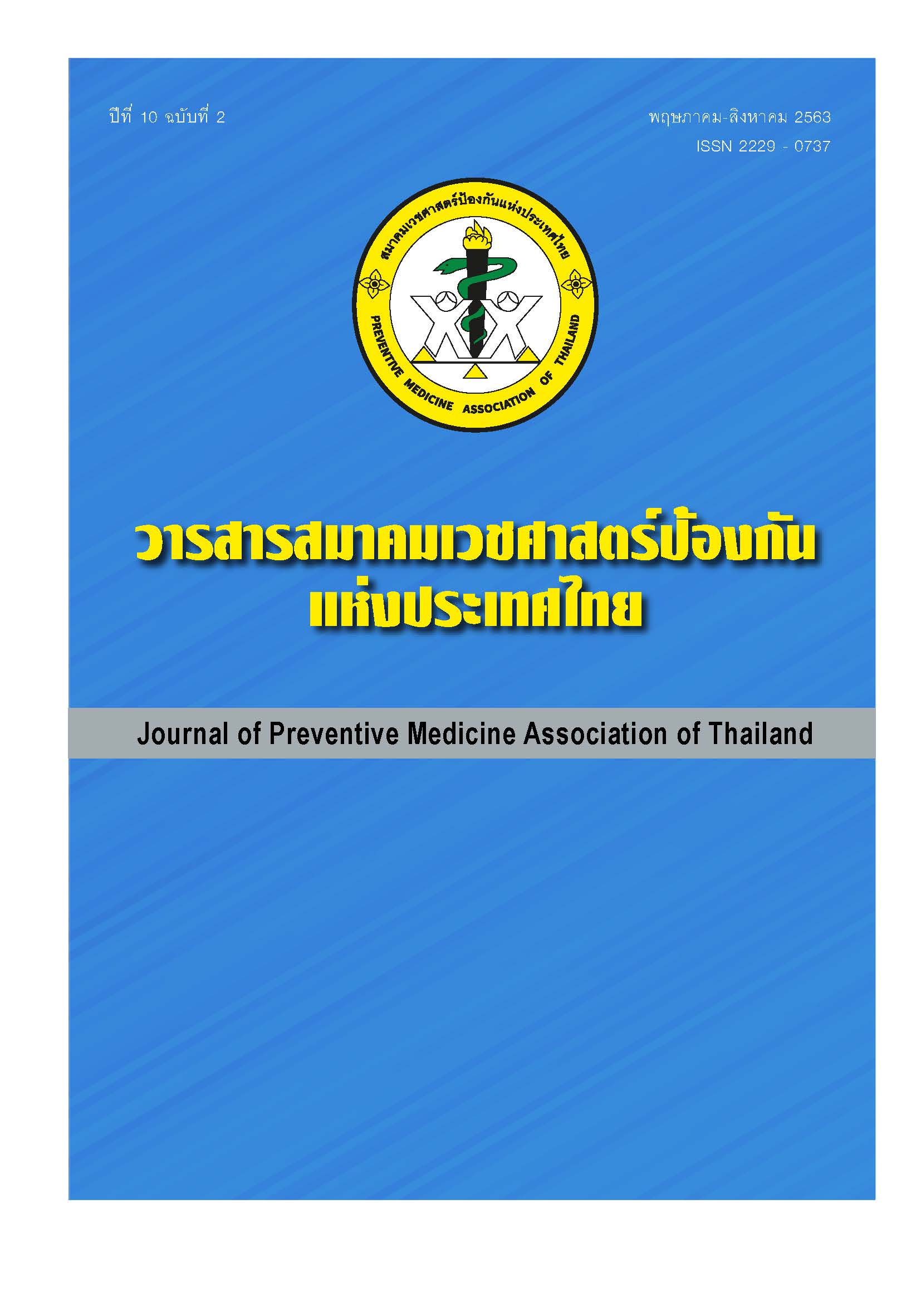The Experience in Controlling Blood Sugar Levels for Type 2 Diabetic Patients
Keywords:
Experience, diabetes controlAbstract
The purpose of this qualitative research study is to study the experience of successfully controlling blood sugar in type 2 diabetic patients by conducting In-depth interviews for 11 respondents, Purposive sampling was used to recruit the 11 respondents. Giorgi’s method was used to analyze data. The findings revealed that the components to control diabetes consist of: 1. The definition of diabetes in respondents related to diet control 2. Recognition of glycemic control depends on blood sugar levels assessed through blood sugar testing and symptoms regarding hyperglycemia or hypoglycemia 3. Self-care behaviors for controlling blood sugar include changes in diet, drinking plenty of water, continual exercise, routinely taking medication and herbal supplements 4. The feeling associated with diabetes are fear and boredom 5. One’s perception in controlling diabetes depends on self-control 6. A negative experience is motivation for behavior modification in controlling their blood sugar levels 7. A sense of accomplishment and pride is established when the blood sugar is kept in control therefore encouraging the patient to continue maintaining healthy blood sugar levels for Type 2 diabetics.
References
2. อัญญา ปลดเปลื้อง. การวิเคราะห์ข้อมูลเชิงปรากฏการณ์วิทยา. วารสารพยาบาลกระทรวงสาธารณสุข 2013;23:1-10.
3. เอื้อมพร หลินเจริญ. การวิเคราะห์และนำเสนอผลในงานวิจัยเชิงคุณภาพ [อินเตอร์เน็ต]. 2558 [เข้าถึงเมื่อ 5 มี.ค.2563]. เข้าถึงได้จาก http://www.edu.tsu.ac.th/major/eva/files/journal/DataAnalysis.pdf.
4. American Diabetes Association. Foundations of Care: Education, Nutrition, Physical Activity, Smoking Cessation, Psychosocial Care, and Immunization. Diabetes Care 2015;38 (Suppl. 1):S20–S30. DOI: 10.2337/dc15-S007.
5. อารยา เชียงของ. ผลการพัฒนาความรอบรู้ด้านสุขภาพด้วยการจัดการเรียนรู้เพื่อการเปลี่ยนแปลงที่มีต่อพฤติกรรมการควบคุมระดับน้ำในเลือดของผู้ป่วยโรคเบาหวาน [ปริญญาปรัชญาดุษฏีบัณฑิต สาขาวิชาการวิจัยพฤติกรรมศาสตร์ประยุกต์]. กรุงเทพ: มหาวิทยาลัยศรีนครินทร์วิโรฒ; 2561.
6. ดวงใจ พรหมพยัคฆ์, รณภพ อิ้มทับ, ภัทรพร จูจันทร์, วันวิสา วัฒนกุล. ประสบการณ์การจัดการตนเองของผู้ป่วยเบาหวานที่อาศัยในเขตพื้นที่สูง: กรณีศึกษา อำเภอวังทอง จังหวัดพิษณุโลก.วารสารพยาบาลสภากาชาดไทย 2560;1:66-80.
7. กมลลักษณ์ พูนศรี, วัชรี ศรีทอง. ประสบการณ์การดูแลตนเองของผู้ป่วยเบาหวานชนิดที่ 2 ที่ควบคุมระดับน้ำตาลในเลือดได้ในเขตพื้นที่โรงพยาบาลส่งเสริมสุขภาพตำบลบ้านบุ ตำบลหนองพลวง อำเภอจักราช จังหวัดนครราชสีมา. รายงานสืบเนื่องการประชุมสัมมนาวิชาการ (Proceedings) การนำเสนอผลงานวิจัยระดับชาติ เครือข่ายบัณฑิตศึกษา มหาวิทยาลัยราชภัฏภาคเหนือ ครั้งที่ 17 [อินเทอร์เน็ต]. 2560 [เข้าถึงเมื่อ 5 มี.ค.2563]. เข้าถึงได้จาก http://gnru2017.psru.ac.th/proceeding/461-25600831133036.pdf.
8. American Association of Diabetes. AADE7 Self-Care Behaviors [Internet]. 2020 [cited 2020 Feb 20]. Available from: https://www.diabeteseducator.org/living-with-diabetes/aade7-self-care-behaviors.
9. อารีย์ รัตนพันธ์. ประสบการณ์การดูแลตนเองของผู้ป่วยเบาหวานที่ควบคุมระดับน้ำตาลในเลือดได้ [วิทยานิพนธ์ปริญญาพยาบาลศาสตรมหาบัณฑิต].พิษณุโลก: มหาวิทยาลัยนเรศวร; 2551.
10. กุลฤดี จิตตยานันต์. ประสบการณ์การดูแลตนเองของผู้ป่วยเบาหวานในตำบลลาดบัวขาว อำเภอบ้านโป่ง จังหวัดราชบุรี. วารสารพยาบาลกระทรวงสาธารณสุข 2557;3:110-21.
11. ทัศนา ชูวรรธนะปกรณ์, สายพิน สุริยวงค์. มุมมองการป่วยของผู้สูงอายุที่เป็นโรคเบาหวาน. วารสารสภาการพยาบาล 2554;4:96-107.
12. Bandura A. Self-efficacy: The exercise of control. NY: W.H. Freeman and Company; 1997.
13. โสพิศ สุมานิต, เรณู พุกบุญ. ผลของการเสริมสร้างการรับรู้สมรรถนะแห่งตนต่อการรับรู้สมรรถนะ การมีส่วนร่วมดูแลผู้ป่วยเด็กภาวะวิกฤตของผู้ดูแล. รามาธิบดีพยาบาลสาร 2554;1:63-74.
14. กาญจนา บริสุทธิ์. ปัจจัยที่มีผลต่อพฤติกรรมการดูแลตนเองของผู้ป่วยเบาหวาน ศูนย์แพทย์เฉลิมพระเกียรติ 80 พรรษา เทศบาลเมืองท่าเรือพระแท่น อำเภอท่ามะกา จังหวัดกาญจนบุรี[วิทยานิพนธ์ปริญญาวิทยาศาสตรมหาบัณฑิต]. กรุงเทพ: มหาวิทยาลัยเกษตรศาสตร์; 2553.
15. Bandura A. Social foundation of thoughts and action: A social cognitive theory. NJ: Prentice-Hall: 1986.
16. อุษา ทัศนวิน, ธีรนุช ห้านิรัติศัย, วันเพ็ญ ภิญโญภาสกุล. ผลของการเข้าค่ายเบาหวานกลางวันต่อการรับรู้สมรรถนะแห่งตน พฤติกรรมการดูแลตนเองและระดับน้ำตาลในเลือดของผู้ป่วยโรคเบาหวานชนิดที่ 2. วารสารสภาการพยาบาล 2553;1:53-66.
Downloads
Published
How to Cite
Issue
Section
License
บทความที่ลงพิมพ์ในวารสารเวชศาสตร์ป้องกันแห่งประเทศไทย ถือเป็นผลงานวิชาการ งานวิจัย วิเคราะห์ วิจารณ์ เป็นความเห็นส่วนตัวของผู้นิพนธ์ กองบรรณาธิการไม่จำเป็นต้องเห็นด้วยเสมอไปและผู้นิพนธ์จะต้องรับผิดชอบต่อบทความของตนเอง






